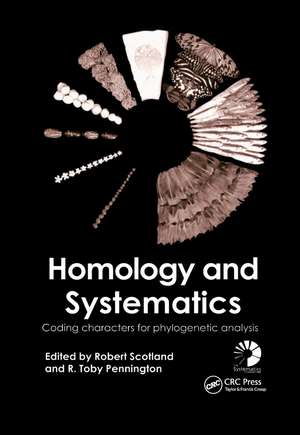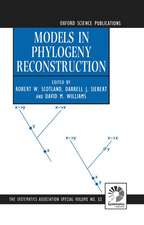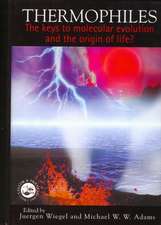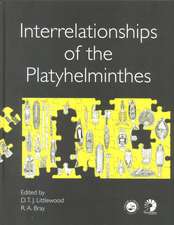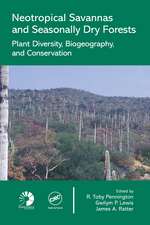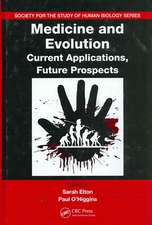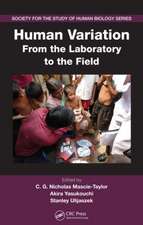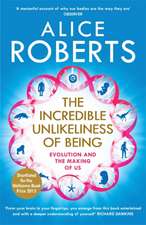Homology and Systematics: Coding Characters for Phylogenetic Analysis
Editat de Robert Scotland, R. Toby Penningtonen Limba Engleză Paperback – 26 sep 2019
| Toate formatele și edițiile | Preț | Express |
|---|---|---|
| Paperback (1) | 389.38 lei 6-8 săpt. | |
| CRC Press – 26 sep 2019 | 389.38 lei 6-8 săpt. | |
| Hardback (1) | 842.02 lei 6-8 săpt. | |
| CRC Press – 24 feb 2000 | 842.02 lei 6-8 săpt. |
Preț: 389.38 lei
Nou
Puncte Express: 584
Preț estimativ în valută:
74.50€ • 78.21$ • 61.84£
74.50€ • 78.21$ • 61.84£
Carte tipărită la comandă
Livrare economică 10-24 aprilie
Preluare comenzi: 021 569.72.76
Specificații
ISBN-13: 9780367398897
ISBN-10: 0367398893
Pagini: 217
Dimensiuni: 178 x 254 x 15 mm
Greutate: 0.45 kg
Ediția:1
Editura: CRC Press
Colecția CRC Press
ISBN-10: 0367398893
Pagini: 217
Dimensiuni: 178 x 254 x 15 mm
Greutate: 0.45 kg
Ediția:1
Editura: CRC Press
Colecția CRC Press
Public țintă
Academic and Professional ReferenceCuprins
1. Homology and the inference of systematic relationships: some historical and philosophical perspectives, Andrew Brower 2. A survey for primary homology assessment: different botanists perceive and define characters in different ways Julie Hawkins 3. Experiments in coding multi-state characters Peter Forey and Iain Kitching 4. On characters and character states: do overlapping and non overlapping variation, morphology and molecules all yield data of the same value? Peter Stevens 5. Heuristic reconstruction of hypothetical-ancestral DNA sequences: sequence alignment versus direct optimisation Ward Wheeler 6. 'Cryptic' characters in monocotyledons: Homology and coding Paula Rudall 7. Process morphology from a cladistic perspective Peter Weston 8. Homology, coding and three taxon statement analysis Robert Scotland 9. Characters, homology and three-item analysis David Williams and Darrell Siebert Forey, The National History Museum, UK, Julie Hawkins, The University of Reading, UK, an Kitching, The Natural History Museum, UK, Toby Pennington, Royal Botanic Gardens, UK, Paula Rudall, Royal Botanic Gardens, UK, Robert Scotland, University of Oxford, UK, Peter Stevens, University of Missouri-St Louis, USA, Darrell Siebert, The Natural History Museum, UK, Peter Weston, Royal Botanic Gardens, UK, Ward Wheeler, American Museum of Natural History, USA, David Williams, The Natural History Museum, UK.
Notă biografică
Robert Scotland, R. Toby Pennington
Descriere
When looking at groups of organisms, shared characteristics (homologues) provide the raw data from which hypotheses of common ancestry may be suggested. In order to explore the relationship between homologues and particular hypotheses of common ancestry, complex matrices are devised, where homologues are coded, allowing theories of homology to be developed and tested. Practically nothing has been written about this matrix-building process, which is fundamental to our understanding of diversity and evolutionary history. This book fills the gap by discussing the ways observations are coded and the consequences for resulting hypotheses using case studies and theoretical examples.
